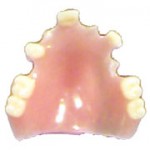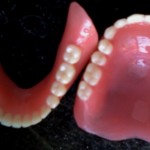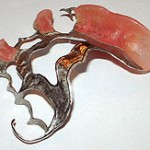Dentures have a bad rap of being unsightly, uncomfortable, and difficult to eat with. However, advances in the way that dentures are made have resulted in dentures that are easy to wear, look great, and—most importantly—fit snugly and comfortably. Ultrathin dentures may be made out of a variety of materials and can fit any number of budgets.
Types

Partial dentures are fitted in place of lost teeth
There are several major types of ultrathin dentures that are available as an alternative to standard dentures. According to Replacement Dentures, one of the most requested types of dentures these days is the “partial” variety. Partial dentures are fitted in place of lost teeth. This means that the remaining teeth stay in the mouth (they need not be extracted) and the partial denture is built around it. A partial denture is either connected to the gum tissue in place of a missing tooth or to a remnant of a tooth. It has the ability to help protect the gums from infection, which can spread to neighboring teeth. Partial dentures are removable and need to be removed each night. The dentures are usually soaked in a disinfectant liquid overnight to kill any bacteria or organic matter in the teeth.
Denture Clinic reports that ultra-thin dentures that cover the roof of the mouth are available as an alternative to partial dentures. Roof dentures, also known as complete dentures, replace every teeth in the mouth. Roof dentures can either be for the bottom row or top row of teeth. Since they can encompass the whole mouth, these dentures pose the biggest aesthetic and personal problem for patients. This is why acrylic and cast dentures are great for complete dentures.
Acrylic dentures are ultrathin partial dentures that utilize acrylic. Often times, acrylic dentures are given to a patient before a metallic ultrathin denture can be created as a temporary measure. Many people do choose to keep acrylic dentures for various reasons, but they tend to break easier because of the brittle nature of the acrylics, especially in thin sections.
Finally, Replacement Dentures suggests that ultrathin metal dentures made from metal provide an excellent alternative to standard acrylic dentures. These alternative ultrathin metal dentures can be made from gold, cobalt, and titanium, among other metals. The dentures utilize the best of both worlds by being light and natural feeling in the mouth, but sturdy enough for everyday use.
Features
Each of these types of ultrathin dentures has certain features which may make them more attractive. Denture Problems.com suggests that one of the benefits to partial dentures, aside from the fact that they will allow you to eat and talk comfortably while you wear them, is that they will stabilize remaining teeth, preventing further problems from occurring as a result of tooth loss.
Denture Clinic reports that ultrathin dentures may be safer than standard dentures in some ways, as they do not allow food to become lodged between the gums and the dentures. They may even be more comfortable, because an individual cannot feel the “shelf” created by the separation of the natural gum and the dentures in the mouth. With full dentures, the entire roof of the mouth is covered by a thin plate.
Finally, Denture Problems extols the virtues of metal dentures. Unlike completely acrylic dentures, which may feel thick and even painful in spite of trimming and polishing, dentures made out of a combination of acrylic and metal usually feel much more natural.
Although ultrathin dentures will feel more natural to the user, the material they are made out of are at a higher risk of damage. Sunlight, for example, can dull acrylic dentures. Toothpaste should never be applied to the dentures either. Most toothpaste products have chemicals in them that degrade the metals in the dentures.
Benefits
Ultrathin dentures are more likely to be worn by individuals due to their comfort and fit. Because partials may be removed, Denture Problems reports that some people have the tendency to take them out at every opportunity. Denture Problems also suggests that full dentures can make the mouth feel cramped and crowded, resulting in unease or discomfort from the wearer. Denture Clinic states that thin dentures allow for maximum ease for wearers of full dentures, and prevent those with removable dentures from feeling the need to constantly take them out for a rest.
Considerations
Talk to your dentist about the various materials available for ultrathin dentures, and what type of denture is right for you. Dentures can be bought anywhere (this day and age, they may even be purchased online), but finding the ultrathin dentures that fit you best is a matter of utmost importance—so talk with your doctor before going with what you feel is the easiest or most affordable option.

